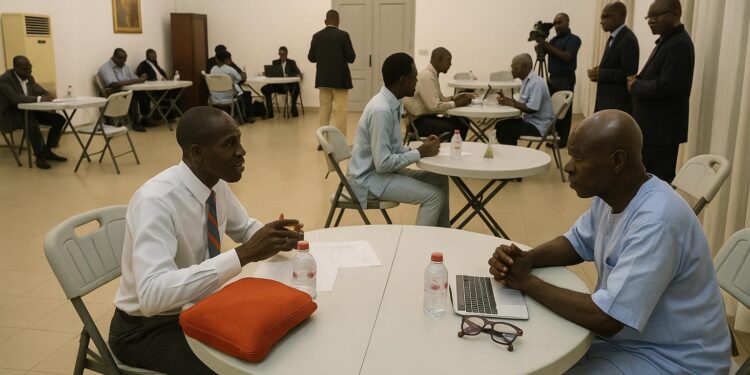Chamber convenes growth-hungry firms
On 16 September, the Chamber of Commerce, Industry, Agriculture and Trades of Pointe-Noire, better known by its French acronym CCIAM, turned its auditorium into a one-stop advisory clinic for entrepreneurs. More than sixty micro, small and medium firms showed up for free, confidential consultations.
President Sylvestre Didier Mavouenzela opened the session by stressing that entrepreneurship does not mean knowing everything. According to him, building a supportive network and accepting the price of expert advice are prerequisites for lasting revenue growth and job creation in the Atlantic seaport’s diversified economy.
Structured consulting process
The chamber mobilised 28 external consultants and four in-house specialists, allocating each company a dedicated time slot. Interviews covered legally registering a business, clarifying missions, drafting marketing strategies and, most importantly, anticipating challenges that typically emerge during the fragile transition from informal activity to formal corporate status.
Marketing expert Beri reminded attendees that financial prudence underpins competitiveness. His formula, use the least money to make the most money, resonated with managers operating in agro-processing, fisheries transformation, retail services and young tech ventures navigating Pointe-Noire’s fast-changing consumer landscape.
Needs tabled by sixty firms
Pre-diagnostic questionnaires, circulated 45 days earlier, had already exposed recurrent constraints: weak bookkeeping, limited access to targeted markets, and difficulty articulating value propositions to bankers. During face-to-face talks, entrepreneurs deepened those findings with sector-specific requests ranging from feed optimisation in poultry units to e-commerce payment integration.
Several artisans also flagged regulatory compliance as a priority, notably the need to align product labelling with sanitary rules. Consultants pointed them to the chamber’s documentation centre and upcoming workshops on quality standards that can unlock both domestic supermarket shelves and, progressively, export niche opportunities.
From Japanese model to Congolese practice
The initiative’s design traces back to a study trip by a CCIAM officer to Japan, where municipal chambers routinely host low-cost clinics for start-ups. Adapting that template required accounting for local realities such as fragmented supply chains and a still-developing digital payment infrastructure.
Mavouenzela argued that the Japanese precedent demonstrates how a disciplined feedback loop between consultants and entrepreneurs can steadily raise survival rates of young businesses. He expects that, with repetition, the Pointe-Noire programme will yield a cohort of firms able to graduate toward bankable investment plans.
Scheduling and follow-up
CCIAM intends to shorten the interval between sessions so that diagnostic, prescription and implementation phases remain closely linked. According to internal planning documents, quarterly clinics are envisioned, coupled with progress tracking sheets that will let consultants measure operational improvements such as stock turnover or margin expansion.
The chamber is also negotiating with local commercial banks to let successful participants benefit from simplified dossier reviews when applying for working-capital lines. While details remain confidential, insiders say lenders view the programme as a cost-effective filter that could lower credit risk in the micro-enterprise segment.
Broader economic context
Pointe-Noire has long served as the Republic of Congo’s commercial gateway, thanks to its deep-water port and proximity to offshore hydrocarbons. Yet a vibrant SME fabric is increasingly seen as vital to diversify beyond oil revenue, absorb urban youth and reinforce the tax base without raising statutory rates.
In that landscape, initiatives that help firms professionalise—instead of remaining informal traders—align with government targets featured in the National Development Plan. CCIAM’s approach, while private-sector led, thus complements public policy agendas aimed at improving the overall business climate and attracting sustainable investment flows.
Investor takeaway
For institutional and diaspora investors scanning the Congolese market, a structured support mechanism eases due-diligence. Firms that emerge from the clinic with audited accounts and clear governance rules can more readily pitch equity partners, participate in public-private projects or integrate regional value chains anchored in neighbouring markets.
Observers note that scaling the programme nationally could build a pipeline of competitive suppliers for upcoming infrastructure, energy or agro-industrial contracts. Doing so would help capture more local content in large projects, keeping value inside the country and reinforcing inclusive growth objectives set by economic planners.
Looking ahead
The inaugural clinic delivered a clear message: collaboration lowers the learning curve. By opening their books to seasoned advisors, entrepreneurs gained not only technical answers but also confidence that their business stories could attract customers, lenders and, eventually, foreign capital beyond Pointe-Noire’s city limits.
CCIAM now faces the task of maintaining momentum, converting advice into measurable performance and showcasing success stories. If the chamber can document tangible revenue boosts at participating firms, the free-consultation model may become a benchmark for chambers across Central Africa seeking pragmatic tools for private-sector dynamism.
Upcoming sessions will integrate digital dashboards enabling entrepreneurs to input sales, inventory and cash-flow figures in real time. Aggregated, anonymised data should allow the chamber to publish sector snapshots, guiding policymakers on where soft financing, export promotion or vocational training would deliver the highest multiplier effect.












































